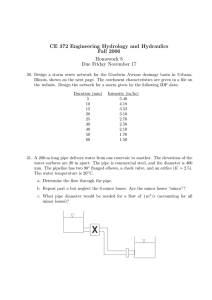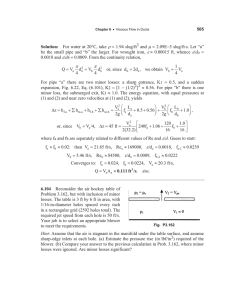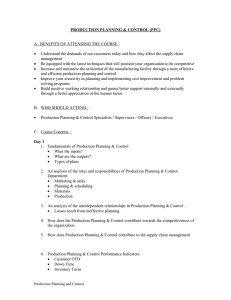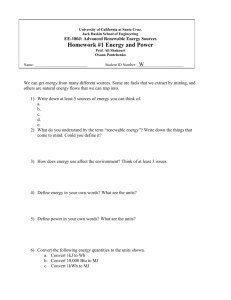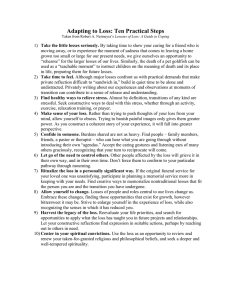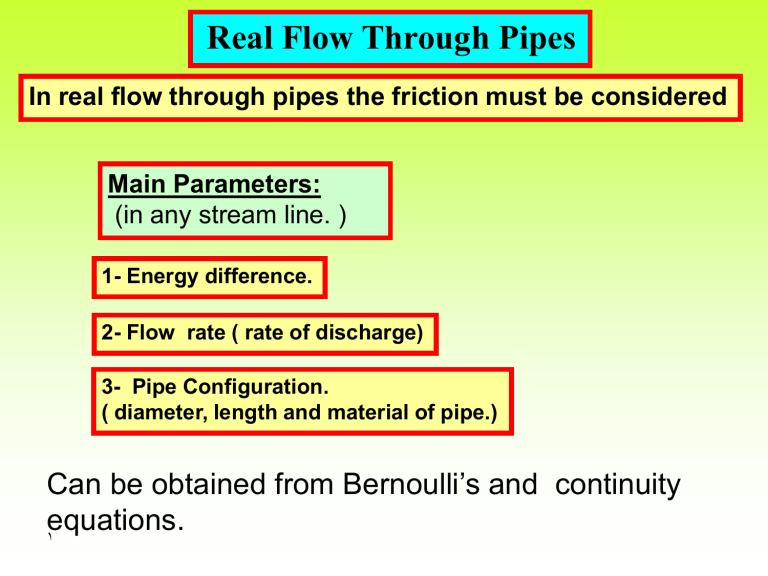
Real Flow Through Pipes In real flow through pipes the friction must be considered Main Parameters: (in any stream line. ) 1- Energy difference. 2- Flow rate ( rate of discharge) 3- Pipe Configuration. ( diameter, length and material of pipe.) Can be obtained from Bernoulli’s and continuity equations. 1 Can be obtained from Bernoulli’s and continuity equations. E1 E 2 h loss12 hL Q V1A1 V2 A 2 hLoss : is due to friction or the formation of vortex. A z1 2 z2 Losses in Pipes Major Losses Losses due to friction Laminar Flow Turbulent Flow Minor Losses Secondary Losses Change in Sections Fittings: Bends, Elbows and Valves…etc. 3 Flow of Real Fluid Through Pipes or Ducts. No slip boundary conditions y(r) u = 0.99 Uo δ : Boundary layer thickness δ Flat plate U L Re ν u Pipe 4 U D Re ν u Laminar Turbulent time Losses in Pipe y(r) Due to friction Laminar Flow Turbulent Flow hLoss : In laminar flow is due to friction between the Fluid layers. hLoss : In turbulent flow is due to friction between the Fluid and the wall boundary or the formation of vortex 5due to the change of pipe cross-section. u Friction Losses due to Laminar Flow du τμ dy Fluid layer Fluid layer dy u du o PA (P dP) A τ o πDdx dPA τ o πDdx πD dP τ o πDdx 4 2 6 Laminar u+du P P+dP dx dP D τo dx 4 P1 P2 D P1 P2 D τo dx 4 4L ΔP f V ρ L D 2 2 7 Where: Darcy equation f : is friction coefficient Friction Loss Head of Laminar Flow 32 μuL 64 L V hf γd Re d 2 g 2 Friction Loss Head of Turbulent Flow 2 2 LV V hf f k d 2g 2g 8 9 Example-1 10 Secondary Losses in Pipes 11 Secondary Losses in Pipes 1- Losses in Pipe Entrance: Fluid 2 V h in 0.5 2g 12 H 2- Losses in Sudden Enlargement: Po 1 V2 V1 P2 P1 13 2 Eddies 2- Losses in Sudden Enlargement: Po 1 2 V2 V1 P2 P1 Eddies P1A1 - Po (A1–A2) – P2A2 = ρA2V2 (V2-V1) Experimentally 14 P1= Po (P1-P2)A2 = ρA2V2 (V2-V1) (P1-P2) = ρV2 (V2-V1) P2 P1 V22 V1V2 ρg g (1) g Applying Energy equation between section 1 and section 2 2 1 2 2 P1 V P2 V h losses ρg 2 g ρg 2 g From equations 1 and 2 V1 V2 2 h losses 15 2g (2) 3- Losses in Sudden Contraction: 1 2 V1 V2 Eddies Vena Contracta Due to the Vena Contracta Ac=CcA Vc V 2 16 h losses 2g AcVc = AV h losses A V V Ac 2g 2 2 h losses A2 A1 17 1 V2 V2 1 K 2g Cc 2 g 0.1 0.3 0.5 0.7 1.0 Cc 0.61 0.632 0.673 0.73 1.0 K 0.41 0.34 0.24 0.14 0.0 3- Losses in Pipe Fitting : (bends and valves) h losses 2 V K 2g Eddies Where : K is the fitting losses coefficient. 18 Fitting Losses Coefficient Gate Valve ( 75% open) Globe valve Spherical plug valve Pump foot valve Return valve 90o elbow 45o elbow Large radius 90o bend Tee junction Sharp pipe entry Sharp pipe exit 19 0.25 – 2.5 10 0.1 1.5 2.2 0.9 0.4 0.6 1.8 0.5 0.5
